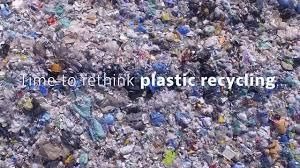Plastic recycling is not enough to tackle the worsening plastic pollution in this world. The abundant disposal of plastic mixed waste is leading our world into toxic waste colonialism and environmental racism actually. The production and disposal of plastic have gained a great hike since now, And the diseases and other health issues as well.
Plastics are of two types- Thermosetting plastics and Thermoplastics. Thermoplastics can be melted and recycled. But thermosetting plastics contain polymers and thus, cannot be recycled. Most plastics originate from crude oil and the ones with PLA labels are made from sugars in corn and plant starches like cassava.
According to studies, about 24-34 million tonnes of plastic waste will enter the water bodies in 2020. And if we continue managing plastic like this, we will be spewing about 90 million tonnes of plastic waste into our water bodies by 2030. The existing plastic waste in the ocean, about eight million tonnes, alone is unacceptable.

Plastic recycling is challenging compared to metal and glass recycling, as plastic has a low density and low value. Also, recycled plastic will downgrade the quality of it. Our Ocean, the United Nations Sustainable Development Goals, and the G7 Ocean Plastic Charter, and many other international platforms have already discussed the issue of plastic wastes and its recycling.
Recycling is not enough to control plastic pollution. We have to rethink our strategies to save our planet as well as our lives. Plastics are collected along with other recyclable wastes for convenience, but in fact, less than 10% of plastic is recycled. Burying of plastic releases toxic gases such as Dioxins, Furans, Mercury, and Polychlorinated Biphenyls which is very harmful to us.
Not every plastic is recyclable, even if it has a recycling sign. So, there is no use to put it in a recyclable bin. There are 7 categories of plastic according to Resin Identification Codes (RIC). Their numerical classification number (#1 – #7) is the only indicator to know the type of plastic used. It’s differentiated according to the temperature at which the material has been heated.
We have to ensure that the companies are responsible for the recycling (life cycle) for their plastic products and the government should introduce new laws, which demands companies to pay for waste collection and recycling or disposal of their plastic products instead of a tax.
We can ensure the health of everyone and our planet to a certain extent through this. It will reduce the damage to our ecology and avoid environmental racism and toxic waste colonialism, thus reverse inequality.
Photo credits – The Guardian and OECD
Information credits – Scroll and National Geographic














Add Comment